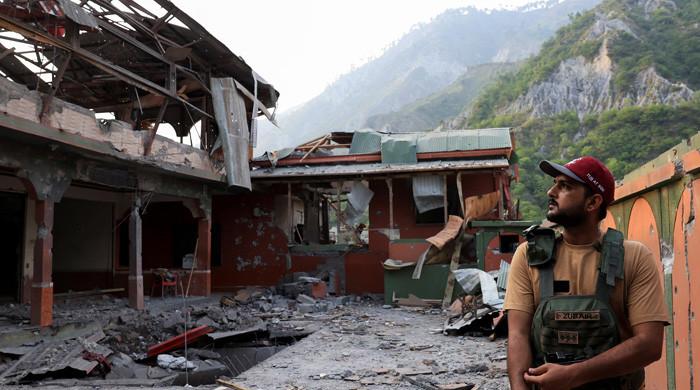The world has witnessed two nuclear powers in head in a kinetic exchange which lasted several days. Several cities have been affected, attacked military facilities and dozens of civil and military deaths have reported. Some of the most deadly and advanced weapons of destruction have been observed in action on both sides.
Global leaders and institutions seemed to be alarms, and finally, a tenuous peace was carried out for the time. However, India calls it a simple break and says that the Sindoor operation is still in progress. It is the closest that the world has reached a nuclear war for decades. It should simply be unacceptable to the world. We have clearly increased the climbing scale of this conflict, and this cannot be allowed to become the new normal.
The nationalist jingism, religious fanaticism, political opportunism and the disproportionate ego divorced from reality cannot be authorized to put the world in danger of nuclear Armagedon. We cannot allow this Russian roulette game to be played several times in the hope that regional and global actors will intervene and give an economy to allow the suspension of hostilities or that one of the countries involved will be willing to take unbearable pain and losses and not to use a nuclear option.
This means that the underlying reasons for the conflict between the two countries must be discussed instead of simply surviving the current conflict and while waiting for the next trigger leads to another, perhaps even more deadly, a cycle of hostilities to engage.
The explosive nature of the underlying fuel material can be assessed by the climbing speed of this crisis. On April 22, a horrible terrorist incident took place in Pahalgam, leading to the death of more than two dozen innocent people. In less than an hour, India criticizes Pakistan, even identifying the supposed guilty and declarations that seek to take revenge are issued. In a few days, non -kinetic escalation begins with India announcing the suspension of the industrial water treaty, closing the corridor of Kartarpur, the two sides closing the border of Wagah, stopping all the trade and expelling many diplomats from each country.
Pakistan prohibits Indian airlines from flying over the Pakistani airspace. In just two weeks, the kinetic action begins, India attacking not only the control line but also the international border. Pakistan immediately retaliated – and the loss of Indian assets and the targets affected in Pakistan are reported worldwide. On the fourth day, climbing reached a level not seen since the 1971 war and certainly not seen since the two countries reached nuclear capacity.
As scary as the speed of this climbing between the two nuclear neighbors was for the world, the concept of the nuclear climbing scale warns that the prospects of the next few days, if the conflict was authorized to continue, could have been much more serious. Basically, the concept indicates that as two opponents rise at the top of the climbing scale, the speed at which the next level of the scale is reached is accelerated. It also makes sense.
At each stage of the climbing, the damage caused to the target country are more important. Therefore, with growing consequences for each escalation, the potential cost of being late in response or being pre -empted by the opponent increases. This creates a situation where, to use a common language, decision -makers can become happy, willing to take the risk of being too early rather than risking being too late.
It is good to see that DGMO level talks have taken place, and another tower is expected soon. However, we have to go far beyond. A complete dialogue must be launched and all important questions for both parties must be discussed. More specifically, the question of terrorism, which has become the trigger point of the current series of conflicts, must be addressed.
India has its own perception and grievances on the question of terrorism supported cross -border. The same goes for Pakistan, which was one of the greatest victims of 21st century terrorism. Last year, the second largest number of terrorism incidents in the world was recorded in Pakistan. If anything, this year, the pace of these terrorist attacks is even higher. It is absolutely vital for peace that these incidents on both sides are fully examined, preferably by neutral third -party inspectors. Terrorism as a state policy instrument can have no place in the world today, and certainly not in a highly militarized nuclear region.
This process is obviously long where major decisions will have to be made by the two countries to create lasting peace. In the meantime, the current status quo of deep mutual suspicions, where high barriers have been created to stop almost all the interfaces between the two countries, provides incendiary equipment for an erroneous perception and the creation of another flash point. All blocked exchanges, all the movements of people through the borders have stopped, the social media and the social media in the other country have blocked the diplomatic presence at least, etc. – These are conditions conducive to upset spirits and the fingers of itching.
Winning a war or a conflict gives rise to a patriotic fervor and nourishes national pride. Winning peace laid the basis for improving the life of the nation of the nation for generations. For more than 1.5 billion people from Pakistan and India, let the management of the two countries come together and gain peace.
Warning: The points of view expressed in this play are the own writers and do not necessarily reflect the editorial policy of PK Press Club.TV.
The writer is a retired business CEO and former federal minister.
Originally published in the news




